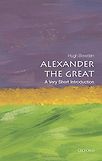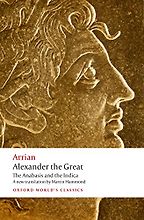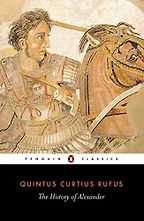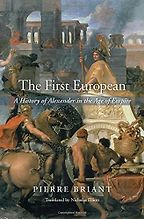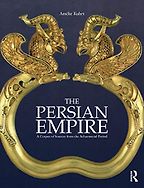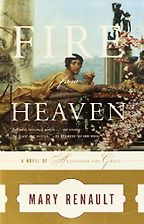Before we get to the books, please could you tell us about Alexander the Great’s background. What was it that led him to go out and conquer the known world?
Alexander was the son of Philip of Macedon and, while in earlier periods, Macedonia had been on the edges of the Greek world, during Alexander’s childhood Philip had made it into the most significant power in Greece. In the course of his lifetime, he became the dominant figure throughout the Aegean world. I think it’s also worth adding—and this is straying into the controversial—that Macedonia was, effectively, set up as a kingdom in the late sixth century BC, when the Persians under King Darius I invaded northern Greece. It was set up as a monarchy, and with that came the establishment of a royal court and the rituals that went with that. Macedon in the fifth century BC had a lot of contact with the neighbouring kingdom of Thrace in the north-east Aegean and had a relationship with the Persians and the local part of the Persian Empire in what’s now north-west Anatolia in Turkey, certainly until the end of Xerxes’ campaign against Greece in 480-479 BC, and probably to some extent after that. So, the Macedonian monarchy was modelled, to some extent, on Persian practices or the practices of other monarchies that emulated Persia.
That suggests that the huge contrast between Greece on one hand and Persia on the other, which is what Greek historians tended to focus on, and which modern scholars also often assume to be the case, wasn’t there quite so much in reality. Alexander would have been more familiar with the kind of things that went on further east.
As soon as Philip subdues Athens and becomes the dominant figure in Greece, he sets up an alliance of almost all the Greek cities, a league of which he was the head (called by modern scholars the League of Corinth), and suggests that the first thing this league should do is invade the Persian Empire in revenge for Xerxes’ campaign against Greece. So, Philip sets up this plan for an invasion of the Persian Empire as a sort of Greeks-versus-Persians, ‘remember-the-Persian-War’, even ‘remember-the-Trojan-War’, conflict. Philip is assassinated soon after this, and Alexander takes over, so to some extent he’s taking over an existing plan. What Alexander brings to this is military skill and ability, which his father also had, but which Alexander shows in great abundance.
Let’s explore how the books you’ve chosen shed light on this venture, starting with Arrian’s Alexander the Great: The Anabasis and the Indica. I think this was written in the second century AD. What sources did he use and why did he write this book?
Arrian, very helpfully, does tell us who he was getting his facts from. He relies principally on two authors. One is Ptolemy, son of Lagus, who becomes Ptolemy I, the first Ptolemaic ruler of Egypt. The other is a Greek called Aristobulus. Both of them accompanied Alexander on his campaigns.
Both of them probably wrote their accounts many decades after Alexander’s death, possibly 40 or 50 years after Alexander’s death, a generation or so later. It’s also worth saying that, although Ptolemy was there at all the battles, he probably often didn’t know what was going on. I think there’s good reason to suppose that Ptolemy actually used other histories to write his own, even though he was an eyewitness. Alexander had an official historian, or someone who is referred to as an official historian, called Callisthenes, who was later arrested, accused of plotting against Alexander and died in captivity. It may be that for the bits where Callisthenes got to before he stopped writing Ptolemy was able to use his account.
So Arrian is using these two figures. The important thing is that they were contemporaries of Alexander and they’re either using their own memory or supplementing their memory with what other contemporaries wrote. Arrian has slightly implausible explanations as to why you should trust them. He says you should trust Ptolemy’s account because Ptolemy is a king and kings don’t lie.
“I think that the modern tendency to point out how bad Alexander was probably misses the point of what historians should be doing”
A third writer on Alexander, who I didn’t choose, is Plutarch, who wrote the life of Alexander the Great round about AD 100, so a little bit before Arrian. In one or two places in his book, he mentions episodes, and lists all the historians who report the event and those who denied it happened. The most obvious one of these is when the queen of the Amazons visits Alexander. Arrian and Ptolemy both deny this happened, but others, including some who were contemporaries of Alexander, people who were there, are listed as having told this story. So, we do clearly have people, even in Alexander’s time or within living memory of Alexander, telling implausible stories about him. Arrian chooses those who don’t do that.
The other thing to say is that Arrian has probably got a particular reader in mind, and that reader is the Emperor Hadrian. Arrian knew Hadrian. Arrian was made a consul and that would have been a decision of Hadrian. Hadrian inherited an empire from his predecessor, Trajan, that reached into Mesopotamia, that included a lot the territory in which Alexander had fought. One of Hadrian’s first acts was to withdraw from the region east of the Euphrates River—so he was abandoning places Alexander had once controlled.
Part of what Arrian is doing in his book is suggesting that there were things that Alexander the Great did that were good, but there were also things Alexander did which weren’t necessarily a good idea for a wise ruler to follow. So Arrian is using Alexander as a model for how to be a king: setting up his bad points as things to avoid and his good points as things to follow.
One other important thing about Arrian is that he’s from a Greek background. He’s from a town in western Anatolia, but he’s very much a figure of Greek literature. He sat at the feet of a famous philosopher, Epictetus, and recorded his work. He wants to present Alexander in a positive light as a Greek, as a sign of how great the Greeks were in the past. This is a ‘look what the Greeks have done for us’ kind of presentation, or ‘look how glorious the ancestors of the Greeks were.’
Is he focused entirely on their military conquests or does he have a broader point to make about Greek culture?
It’s not solely about Alexander’s conquests, although his skill as a general is mentioned a lot. There are stories about Alexander’s interest in culture, sometimes suspiciously so because, for example, Arrian is not particularly keen to suggest that Alexander adopted Persian clothes, but Alexander did adopt Persian clothes and some Persian court practices. Arrian is ambivalent about these, so he does present these aspects in a bad way to some extent, but at the end he says, ‘well, he was only doing it to be a better ruler.’ Broadly speaking, Arrian wants to suggest that most of the time Alexander is moderate and it’s only occasionally that he is excessive. At the very end there’s a sort of obituary of Alexander where he sums things up and he says, amongst other things that, according to Aristobulus, Alexander only ever drank moderately. So Arrian was trying to play down the stories of Alexander getting drunk and doing things in a drunken fury, although even he shows that this happened from time to time.
So, it’s a picture of Alexander as a good character, more perhaps than Alexander as a bearer of Greek culture. But that Greekness is there in Arrian, minimising the extent to which Alexander was working within an Achaemenid Persian set up.
And is it a good read?
It is a good read, yes. The thing that my students tend to find difficult with all these books is getting used to the names. But it tells a good story. It’s got some interesting and exciting events. In the middle there’s a whole series of rather bloody episodes, with Alexander showing off his bad side, but broadly speaking, it is a good read.
Let’s move on to Quintus Curtius Rufus. This book was a bit earlier, I think, and a bit more negative in its picture of Alexander the Great. Is that fair?
That’s right. We don’t know for certain when Curtius wrote, or indeed who he was. There are two possibilities: either he wrote under the emperor Vespasian in the 70s or, possibly, he wrote earlier under Claudius in the first half of the first century AD. He wrote in Latin and he was probably a senator in Rome.
The other problem we have with Curtius is that, unfortunately, the first two of the ten books of his history are missing. That’s a pity, because it means we don’t have his account of the early stages of Alexander the Great’s career. But, more significantly, it means we don’t have his introduction and we don’t have his conclusion either because there are also bits missing later on. In the beginning, in his prologue, he may well have said something about who his sources were and what his aims were in writing, but we’ve lost that.
He’s using a different source from Arrian. Scholars generally believe, although Curtius never mentions it, that he is using the work of a man called Cleitarchus who was probably writing in Alexandria in Egypt, probably about the same time as Ptolemy. But Cleitarchus was someone who had not campaigned with Alexander. So Cleitarchus is getting all this information second-hand, and it’s generally thought that Cleitarchus is more interested in fantastic stories than Plutarch and Aristobulus.
Five Books interviews are expensive to produce. If you're enjoying this interview, please support us by donating a small amount.
It’s worth saying some of these descriptions of non-Greek activity seem to be more plausible and more likely to be accurate than the alternatives. It may well be, for example, that Cleitarchus understood more about Egyptian religious rituals. All the historians give a description of Alexander visiting an oracle in the Libyan desert. The process Curtius describes sounds much more like what actually happened in Egypt than, for example, the story Arrian relates, which we know is very close to what Callisthenes said, and which is probably also what Ptolemy said, which tends to present the oracle much more like a Greek oracle.
So Cleitarchus is probably in some areas, particularly in relation to non-Greek practices, more reliable than the others.
But the other thing to say is that Curtius is writing as a Roman, a Roman senator, in a period when Roman senators were still coming to terms with autocracy. And, if he’s writing under Claudius, he’s writing in the wake of Caligula’s reign and, if he’s writing under Vespasian, then in the wake of Nero’s reign. Either way, he’s writing soon after the reign of a particularly unpopular and unsuccessful emperor with a very bad reputation, and he seems to be presenting, in the book, some of the faults of Alexander the Great as the kind of faults Caligula and Nero were accused of—arrogance, autocracy, tyranny, lack of freedom, a lack of respect for the aristocracy.
“The Macedonian monarchy was modelled, to some extent, on Persian practices or the practices of other monarchies that emulated Persia”
It’s also worth saying that Curtius is very down on the Greeks. He makes a distinction between Macedonians and Greeks and on the whole the Macedonians are mostly okay, but the Greeks are the real trouble. The Macedonian soldiery come across as sort of proto-Romans and the Greeks come across as these very problematic, wily, untrustworthy figures. I think, for Curtius, the extent to which Alexander is more Greek, and therefore less Macedonian, lies at the root of what causes him to go wrong. Curtius’ book is not short on stories about Alexander and, whereas Arrian talks about Alexander the Great’s self-restraint, Curtius keeps on talking about how he loses control of his appetites. For example, after Alexander’s first battle against Darius at Issus, Alexander captures the Persian camp followers, including all the royal household, Darius’ wife and daughters, and also Darius’ harem of 365 concubines, which gave him a different person to sleep with every day of the year. Curtius implies in his book that Alexander the Great took the harem over but says that maybe Alexander didn’t use it as frequently as Darius. Arrian doesn’t mention this at all.
He is also very keen to emphasise Alexander’s reliance on superstition, again in contrast to Arrian. Arrian has Alexander trusting a wise Greek soothsayer, called Aristander. When Alexander starts trusting the Babylonian astrologer/priests who are an important part of Babylonian royal and religious life, Curtius sees this as an indication that Alexander is succumbing to foreign superstition. He is keen to emphasise how often Alexander relies on these things and, because the Romans have a different approach to divination, Curtius is more scornful of all the divination Alexander uses and much more prepared to think that it is all trickery and fakery.
Was that kind of divination being used by contemporary Roman emperors?
Famously, the emperor Tiberius tried to ban astrologers from Rome, but had his own astrologer. There was Roman imperial hostility to astrologers in principle but the use of them in private. It was perceived to be a problem by senators like Curtius.
Now to Pierre Briant’s The First European: A History of Alexander in the Age of Empire. This book is about Alexander the Great’s reception in the Enlightenment, isn’t it?
Just to join the gap, the first two books we were looking at are the earliest surviving, or some of the earliest surviving, narratives about Alexander the Great, even though they were written centuries after his time. In the medieval period people didn’t read the Greek texts, Greek wasn’t a language used in western Europe. Maybe Curtius was read a bit, but the dominant stories told about Alexander came from The Alexander Romance. It’s difficult to know how to describe this because it’s an evolving story that starts in Greek in the 3rd century BC, probably. We come across it in a manuscript that dates from the third century AD in Greek, but it’s translated into lots of other languages including Latin and Persian. Ultimately it goes on spreading into the modern period, so you have Scottish Alexander texts, you even have Icelandic stories about Alexander. And this is a story full of fantasy, it’s imaginative and not strict history.
And then in the Enlightenment period you start to get a return to interest in the Greek texts and in a more scientifically historical study of Alexander and this coincides with the periods of European overseas expansion. You have people writing about Alexander in the light of what French Kings like Louis XIV are doing and other European countries embarked on overseas expansion. A series of ideas about Alexander develops. Then, there’s this big change of direction after the American war of independence, with the British and French focusing more on India and indeed Persia and the growth of Russian power to the north, leaving Persia and Afghanistan as the borderlands between Russian interests and British interests.
You’ve also got, at the beginning of the 19th century, Napoleon invading Egypt and the French getting this strong brief interest in Egypt before the British move in. So, at the very end of the 18th century and in the early 19th century the modern battles of empire are taking place in the territories where Alexander had fought, and Alexander’s empire becomes an interesting model for people thinking about their world. Alexander the Great is interpreted in the light of contemporary imperial and colonial ideas and that’s what Briant talks about in this book.
The book was originally written in French and published in France and there’s quite a strong French focus to it, although when the English translation was prepared, this was balanced slightly differently. You have emphases on Alexander as a kind of scholar-King, Alexander as an advocate of trade and the creation of a commercial empire. You also have an interest in Afghanistan as this borderland between British India on the one hand and Russia on the other, and people becoming fascinated by what Alexander did in Afghanistan—where he went, and finding the places that he went to. Alexander gets tied to ideas related to the Great Game, the world of espionage between the British Empire and Russia in the second half of the 19th century.
Briant chooses to end the book talking about German interest in Alexander the Great. This is interesting, because at the time when the reunification of Germany was happening under Bismarck, you have Johann Droysen writing a history of Philip and then of Alexander. Droysen sees Philip as a Bismarck-like figure, uniting the Greeks in the way that Bismarck united the Germans, so these multiple small states are brought together in a useful empire as preparation for Alexander’s imperial achievements.
A lot of modern scholarship has tended to go back to Droysen, and what Briant does is tell the story before Droysen. If you read any modern book about Alexander the Great, although they will say that they’re going back to Arrian and Curtius and the other two or three ancient narratives, their approach is schooled by this tradition of how you write about Alexander that comes to us from Droysen. But before then you have all these other writers—French, English, Scottish—who start to create in their books this 18th- and 19th-century version of Alexander the Great that is, in many ways, the lens through which everyone who writes a biography of Alexander has tended to look.
Louis XIV and Napoleon both to some extent consciously modelled themselves on Alexander, but was there hostility to him it that era, with the widespread reluctance in the Enlightenment to glorify war?
Yes, absolutely. Alexander as a tyrant and therefore a bad thing is also one of the models that Briant discusses, especially in the period after the French Revolution. There are multiple ways in which Alexander can be a model and this does include the idea of the absolute monarch as a bad thing. So, whereas Louis XIV or Napoleon can see Alexander as a good model to follow, others see Napoleon and absolutist monarchy as a bad thing and for those writers Alexander is a model in a negative sense.
Tell us about Amélie Kuhrt’s The Persian Empire: A Collection of Sources from the Achaemenid Period. Are any of the sources that are gathered in this book closer in time to Alexander the Great than Arrian or Curtius?
The first thing to say is that if we want to get away from the tradition of writing about Alexander the Great that Briant describes in his book, we need to take the Persian evidence seriously and to understand better the empire in which he worked and to recognise that—going back to what I said at the start—it’s not straightforwardly Western Alexander conquers Eastern Persia. It’s Alexander coming from a monarchical tradition that has been influenced by Persia. He moves in and he essentially seizes control of the Achaemenid Persian Empire and he adapts it to his purposes. The other thing to mention is the myth—and again the ancient writers like Arrian, Curtius and others are to some extent the source of this—that Persia was weak, divided, feeble and ripe for conquest. But if we look at the Persian evidence it’s much less clear that it’s as simple as that.
So, the point about Kuhrt’s very very large book is that it gives us a better picture of what Persia was like. I should say, I was torn between suggesting this and suggesting Pierre Briant’s From Cyrus to Alexander: A History of the Persian Empire, but I thought I’d already chosen Briant’s The First European and, actually, going back to the ancient evidence is important.
“In the Enlightenment period you start to get a return to interest in the Greek texts and in a more scientifically historical study of Alexander”
The problem we have is that actually evidence about the Persian Empire mainly comes from the sixth and first half of the fifth centuries BC. The major buildings that survive, the inscriptions and other documents, of which there are quite a lot, are mostly from the early period, in particular from the time of Darius and Xerxes. By the time you get to Alexander’s period, for whatever reason, there are fewer inscriptions, or at least fewer surviving. There’s less information about what’s going on. We do have some documents written on leather in the Aramaic language from Bactria—the area of modern Afghanistan—that date from Alexander’s period and that fit in with other stuff that that’s in Kuhrt, but we have relatively little specifically about the empire under Alexander.
What Kuhrt provides us with is a clear idea of how the Empire functioned because, broadly speaking, it carried on much the same throughout the fifth and fourth centuries. Some of the material Kurt includes are Greek reports of Persia, so it’s not all Persian documents. It does include contemporary-ish Greek sources. So, we are reliant to some extent, even when we go back to the sources, on Greek perceptions of Persia. But the whole does allow us to see the Persian Empire as an efficient, well-run state with considerable resources and a highly developed organisation. It’s something that, by defeating Darius, Alexander is able to adopt and take over. And what makes it possible for him to run Persia for the brief time that he does before his death is his maintenance of Persian governmental structures and—what was controversial to people like Arrian and Curtius—his adoption of some of the practices of how to be an Achaemenid King and how he related to the Persian hierarchy by adopting these practices.
Some of the extreme practices that the Greek authors described Alexander taking up, for example getting people to prostrate themselves in front of him, are clearly a misunderstanding of Persian practice. So again, it’s useful to have documentation about the Persian Empire from earlier periods, images of what proskynesis, which Arrian thinks means prostration, actually involves. Descriptions of the practice from Herodotus, writing in the 5th century show that, as far as he was concerned, proskynesis wasn’t about prostration. So, we have these sources which help us to get a more accurate impression of what the Empire that Alexander conquered was like, written by people who were not anxious to sell a particular picture of Alexander.
You say he took over the machinery of the Persian Empire. Was he accepted by the Persians after he defeated them in battle? I mean, did the elite accept him as their monarch or did he face perpetual problems on that front?
‘Both’ is the answer. There was quite a lot of acceptance, but there was resistance, too. After the battle of Gaugamela, which was Alexander’s second and final defeat of Darius, Darius fled to Afghanistan to regroup. There he was assassinated by one of his generals, who then took the throne under the name of Artaxerxes, until he himself was subsequently captured by other Persians. Later on, after campaigning in the Indus Valley, Alexander comes back and finds that, in one or two places, the people he appointed as provincial governors have been replaced and that some of the people who have replaced them are setting themselves up as Persian King. So, there was clearly resistance, but this is from members of the elite trying to re-establish or increase their own status, rather than there being general unpopularity. Probably, for most people in the Empire, it made relatively little difference who was king.
In other parts of his Empire—Egypt, for example—there seems to be no evidence of any problem with having a non-Egyptian king. They’d had that before. Alexander is presented in Egyptian temple sculptures as looking exactly like a traditional Egyptian pharaoh. Similarly, in Babylon the scholar-priests very much start operating their system to work for Alexander. So, broadly speaking, it was possible for him to slot into this new role. Inevitably there were ambitious Persians who didn’t accept it and who wanted to take power for themselves, but I think that that’s better seen as a question of individuals rather than there being a groundswell of opposition to him.
You mentioned that sources directly related to Alexander the Great are quite thin on the ground, but is the picture that the Persian sources paint of him in this book reasonably consistent with what we learn from Greek and Latin sources? Is there anything that’s radically different?
We have no actual Persian information about him. We do have some Babylonian evidence.
There’s a reasonable amount of material and it very much presents him as a typical king of Babylon. So, he’s supposed to do the rituals and they look after him in the same way that they would look after any other king. I think the answer is that, where we do have indigenous sources, which is Babylon and Egypt in particular, he comes across very much as in the mould of how a Babylonian or Egyptian king should behave. In that sense, there is a difference because this—as I was suggesting earlier—is something that the Greek and Roman sources tend to downplay. For example, there are some stories of Persians or Babylonians behaving weirdly when Alexander does something, which are probably either accidental or deliberate misreadings of more typical Babylonian or Persian practice.
To give an example, towards the end of his reign there’s a story told about how Alexander is exercising and has taken off his royal clothes and put them on his throne, which is nearby. And a madman or a prisoner puts them on and sits on the throne and everyone’s very upset by this, and the madman is dragged off and executed, but actually this is almost certainly a version of a standard near-Eastern substitute-King ritual where, when eclipses and other astronomical events portend danger to the king, the king temporary abdicates and a madman or prisoner is put on the throne so that the risk will fall on him. Then, when the period of danger has passed, they’re executed. So, this seems to be a Greek re-interpretation of a standard Babylonian or near-Eastern practice and it suggests that Alexander was quite happy to follow the guidance of locals and work with the local way of doing things. Arrian and Curtius are somewhat suspicious of this and think that these were people trying to hoodwink Alexander.
Let’s move on to the final book, which is Mary Renault’s Fire from Heaven: A Novel of Alexander the Great. She’s a 20th century novelist. Tell us a bit about why you chose this.
There are quite a lot of novels about Alexander and I think that, of them all, Mary Renault’s is the most readable and the most entertaining. It’s the first of what’s called the Alexander Trilogy, although it’s a slightly odd trilogy and the third volume, Funeral Games takes place after Alexander’s death.
Mary Renault really knew her sources. She really understands the material. She has another particular interest and that’s in homosexuality. So, both in Fire from Heaven and in the second volume The Persian Boy, there’s quite a lot of focus on Alexander and male lovers. In Fire from Heaven, this is Hephaestion who, historically, probably wasn’t significant in Alexander’s life until much later, but who was at the Macedonian court. So what Renault is doing is plausible.
The reason I chose Fire from Heaven rather than The Persian Boy was partly because this is the only book I’ve chosen that depicts Alexander’s childhood. One of the other ancient sources, Plutarch, does have accounts of it and, to a significant extent, this is based on that, although Renault does much more with the material. There’s a wonderful episode when Athenian ambassadors come to Macedon and she presents a negative picture of Demosthenes, who in subsequent periods became that last hero of Greek freedom, a symbol of democracy fighting monarchy. Mary Renault’s Demosthenes is this rather unpleasant, badly spoken Greek and his rival, Aeschines, comes across as a much nicer figure and I think this is a more realistic reading of the two historical figures.
The other thing I’d say—and this sort of takes us back to Arrian—is that what authors in antiquity were doing when they wrote about Alexander was essentially telling a good story. This would include writing speeches for figures in their histories. They would base it as much as possible on the evidence. So Arrian uses Ptolemy and Aristobulus, but they would want to make it more readable and in a higher style, more impressive altogether. And that’s essentially what historical novelists do. So, although this is presented as a novel, it is, in a sense, as useful as Arrian in terms of it being a way of getting us to think about Alexander. Arrian has an agenda and Mary Renault has an agenda. Arrian is using sources and Mary Renault is using sources. Mary Renault is more similar to Arrian than most of the history books written about Alexander. They’ve both got this same interest in telling a good story and getting you to react to Alexander in a particular way.
What is the story that the book tells of Alexander the Great’s youth? What does she tell us about his formation?
She is giving us a picture of his relationship with his parents, the extent to which from an early age, he is engaged in Macedonian politics, but also—and this is where she is her most inventive—this particular interest in his relationships with his young companions, his friends and, in particular, this love story between him and Hephaestion with whom he grew up and for whom, when he died, Alexander is said to have organised extremely lavish funeral celebrations. So, it’s about his development as a character and he comes across as an attractive figure, clever and interesting, again, in contrast to a lot of a lot of modern scholarship. Modern accounts of Alexander tend to be rather negative about him, to emphasise his cruelty and tyranny. These days Curtius, with his emphasis on Alexander’s negative aspects, is a lot more fashionable than Arrian. Mary Renault is much more positive.
I think that the modern tendency to point out how bad Alexander was probably misses the point of what historians should be doing. I think it presents a way of looking at Alexander that is unhelpful. Mary Renault’s novel is possibly slightly innocent, but overall presents him as this loveable figure, I suppose, but in a serious way.
One final question, which leads on from that. Do you think Alexander would have seen himself as a success or did he die a disappointed man?
Well, he died young, from a fever while still planning his next campaign. But, I think he would have seen himself as successful. He won every battle he fought, he had successfully taken over the entire Persian Empire. Again, to be controversial, there is the story that when he reached the river Hyphasis his troops forced him to turn back and prevented him from conquering India. I share the view of those scholars who think that this is probably a myth, that Alexander never really intended to go further. He probably did want to cross the Hyphasis but was prevented by bad omens, but he would not have travelled far to the east of the river. He did march down the eastern side of the Indus when he marched down the Indus Valley and that was effectively the boundary of the Achaemenid Empire. He did get the rulers on the far side of the Indus to support him. So, I think his eastern campaign was an unmitigated success, apart from his own injuries. He had to deal with a certain amount of insurrection when he got back, but basically if his target was to take territory from the Persian king, he ended up taking the whole of the empire of the Persians and replacing the Achaemenid dynasty; so that, I think, was a success and he would have recognised it as a success.
He was probably planning to move into Arabia next. He might, had he lived longer, have campaigned further west, but essentially, I think he would have seen himself as having been successful. At the end of the Indus campaign, he has some medals struck in silver, large coins which are called decadrachms, 10 drachma pieces, and they show, on one side, Alexander on horseback fighting a man on an elephant, which is a depiction of one of his battles in India. And, on the other side, Alexander holding a thunderbolt and being crowned by a flying figure of Victory, holding a wreath over his head.
So that’s a symbol of Alexander: victorious, unconquered—a word that sources often use about him. And not only unconquered but, by holding a thunderbolt, equivalent to a god. That image presented of him as the unconquered god was not megalomaniacal, not thinking that he is immortal or anything, but recognising that he has these achievements which are huge, and that only gods and heroes, like Heracles, have ever approached. I think that image is probably how he would have thought about himself at the end of his reign.
Five Books aims to keep its book recommendations and interviews up to date. If you are the interviewee and would like to update your choice of books (or even just what you say about them) please email us at [email protected]

